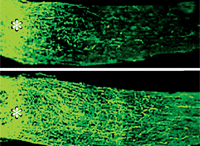Researchers at Children’s Hospital Boston have documented extensive optic nerve regeneration in mice, according to a study in the November 17 issue of the Journal of Neuroscience.

In earlier research, retinas treated with beads containing oncomodulin showed increased growth of axons in the optic nerve (bottom) compared with controls (top). (Asterisks mark injury sites.) Image: Children’s Hospital Boston
Before this, there was no proven way to regenerate optic nerve tissue and restore sight in patients with degenerative ocular conditions, such as advanced glaucoma.
The researchers discovered that two specific molecular pathways, which each promote optic nerve regeneration on their own, can work synergistically by targeting the protein oncomodulin. Oncomodulin activates the intrinsic growth state of nerve cells in the retina by elevating levels of the small signaling molecule cyclic adenosine monophosphate (cAMP) and deleting the gene that encodes PTEN, an enzyme that inhibits cells growth.
These processes allow injured retinal nerve fibers to re-grow over long distances, down the entire length of the optic nerve and across the optic chiasm. In rare instances, some nerve fibers even reached the thalamus, a deep brain region that is critical for the early stages of visual processing.
At the conclusion of the study, the researchers noted approximately 10 times more optic nerve regeneration when both molecular pathways were simultaneously activated in mice than when either pathway was activated alone.
“This is really a massive change,” says principal investigator Larry Benowitz, Ph.D., member of the neurobiology and neurosurgery departments at Children’s Hospital and a professor of surgery and ophthalmology at Harvard Medical School. “It brings us closer to potentially restoring function after vision loss caused by optic nerve damage.”
Nonetheless, more research must be done before this regenerative strategy can be applied to humans.
More specifically, the researchers must uncover an effective way to deliver sufficient levels of oncomodulin to the eye over an extended duration, or induce its production without causing severe inflammation, Dr. Benowitz says.
Kurimoto T, Yin Y, Omura K, et al. Long-distance axon regeneration in the mature optic nerve: contributions of oncomodulin, cAMP and PTEN gene deletion. J Neurosci. 2010 Nov 17;30(46):15654-63.

